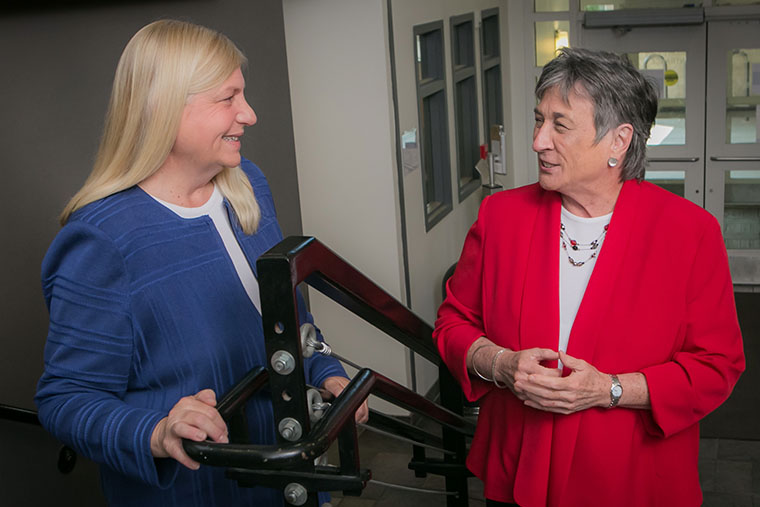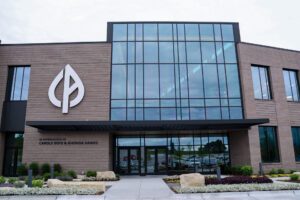Community Alliance – Reflecting on 40 Years

“One of the benefits of celebrating anniversaries, especially a milestone anniversary, is the opportunity to reflect on where you’ve been and where you’re going,” said Carole Boye, Community Alliance CEO. That’s exactly what we asked her and Community Alliance’s Chief Operating Officer Aileen Brady to do in a recent interview about the agency’s 40th Anniversary.
“We both had the privilege of knowing and working with the founders from the very beginning – mothers and fathers with adult children living with serious mental illness,” Boye related. “What an amazing opportunity it was to be a part of helping fulfill their vision of a better quality of life for their adult children and others facing mental illness from the very beginning.”
It Started with Listening
“It all started with listening,” said Brady, who was a volunteer with the organization in 1981 and joined the staff in year two. “We listened to the people we serve, to family members, and to our community about their needs and concerns, and what they wanted, and what we heard formed the foundation of every program developed these last 40 years.” Initially, the families wanted a safe place for their adult children to live independently, so Community Alliance developed supportive housing programs, first through leasing apartments, then by building them. Today, the agency owns and operates more than 100 apartment units and 48 group residential beds scattered across the city.
Similarly, the agency’s homeless services began in response to listening to area emergency shelters who noted the high prevalence of mental illness among their guests. This led to the development of the community’s first homeless outreach team and setting up an evening clinic where people experiencing homelessness could access initial mental health services with the help of the outreach workers. Day programs, employment programs, the introduction of national best practice models like assertive community treatment, SOAR and first episode psychosis, along with family education and peer support all followed a similar course.
Listening has also been essential to implementation of Community Alliance’s integrated care model. “We were hearing from too many clients that their physical health concerns were being routinely dismissed by primary care doctors as a symptom of their mental illness and we were seeing too many struggling with illnesses that could and should be treated,” Brady said. This coupled with national data showing a 20- to 25-year early mortality rate among those with serious mental illness, attributable in large part to treatable physical health conditions, led Community Alliance to add primary health care to its continuum of care. “Our approach to integrated care continues to evolve each and every day as we work to identify and address the full range of a person’s individual needs – mental health, physical health, social wellbeing and socio-economic support,” she added.
The Story Behind the Name
“We are often asked about our name”, reflected Boye, as the conversation continued. “Our founders initially considered aligning themselves with an existing mental health agency or hospital, knowing that starting a new nonprofit from scratch was a formidable task. But their real vision was (1) to develop a resource that was available to anyone, any family who was struggling with a mental health challenge regardless of which doctor or therapist they saw and (2) to educate and align the entire community in support of these individuals. That’s why we were born as a free-standing agency, with an initial Board of family members working alongside mental health professionals and business leaders from across the community. Our founders wanted and created an alliance of the community working together on behalf of those living with mental illness, therefore the name – Community Alliance.”
Progress Over the Years
Both leaders pointed with pride to the agency’s pioneering approach throughout its 40-year history, going beyond traditional treatment services to help people achieve social well-being and purpose. “We have definitely moved from a care-taking approach to a recovery approach,” said Boye.
“Helping people to live, work, learn and contribute: that’s our mission statement and one that I think articulates this change,” Boye continued. “Instead of hospitalization, we work alongside individuals in the community to build on their inherent strengths, emphasize wellness over illness, and help them realize their unique potential through contribution and connectedness with family and community.”
“Also of note is the rise of self-advocacy over these past 40 years”, said Brady. “The voices of individuals and family members have grown exponentially, helping to reduce the stigma and improve the quality and responsiveness of services. As people most directly affected by these illnesses have found their voices, they have become the leaders of their own recovery which is how it should be. Their voices have also promoted greater awareness and willingness for people to speak out about needing help and advocating for greater resources”.
Supporting our Community into the Future
“Our vision and goals for the future start with maintaining – and expanding – this alliance of the community on behalf of those facing mental illness,” Boye offered. “We want to build on the advances in treatment that have been made and make sure people have access to that treatment whenever and wherever they need it. We want to move beyond what I call our system’s ‘Stage 4’ mentality, meaning that you don’t have to wait until the mental health challenge you are facing has reached a critical or crisis stage before you can get help.”
“We want to continue to provide a place where people feel welcome – a place where people are treated with dignity and respect, where they feel hope, and where they are helped to develop the strengths and tools needed to overcome whatever mental health challenge they are facing. We want to be the center of excellence for individuals with mental health challenges across their lifespan while we continue to expand our partnerships with others throughout the community,” she concluded.
Help is within reach
At Community Alliance, we offer a full range of integrated health services including primary and psychiatric care, mental health and substance use counseling, rehabilitation and employment services, supportive housing, and community, family and peer supports.



